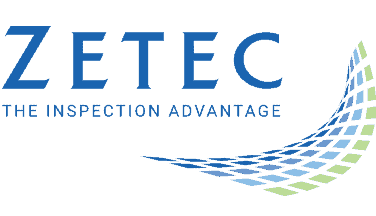Eddy Current Inspections of Friction Stir Welds in Aerospace
By Jesse Herrin, Zetec Product Manager – Eddy Current Systems
Aerospace manufacturers use friction stir welds (FSW) to fabricate many of their biggest aluminum alloy structures. Stir welding is highly automated and speedy. A machine clamps two workpieces together and plunges a rotating spindle into the joint line, and the spinning action generates friction and heat. The adjacent metals soften and flow from the front of the tool to the trailing edge, where the grains mix and recrystallize to form a strong, efficient bond.
The result is a clean-looking weld with three distinct zones: an outer heat affected zone (HAZ) where the metal’s properties are affected but no deformation occurs; an inner thermo-mechanically affected zone (TMAZ) where grains are deformed but not mixed; and a stir zone or “nugget” comprised of very fine equiaxed grains.
Because the joining process involves low peak temperatures and the materials remain in a solid state throughout, a stir weld isn’t susceptible to porosity, cracking, distortion and other discontinuities that occur when metals are melted and then solidify. Most flaws are related to setup issues that result in excessive or insufficient heat, such as improper spindle rotation speeds.
When manufacturing defects do occur, they fall into three general categories: volumetric voids, like “wormholes” and cavities; joint-line flaws like “kissing bonds,” where two butted materials fail to coalesce completely; and “hooking,” an uplift of surface oxides on the advancing side or retreating side of a lap weld.
To a qualified NDT technician, a stir-welded lap-joint or butt-weld is not technically difficult to test. In applications like aerospace, the bigger issue is the size and scope of the inspection. Stir welds are used on everything from wing assemblies on airplanes to rocket boosters and fuel tanks on launch vehicles. Since welds may span dozens of meters across complex shapes and geometries, any inspection method be not only effective but fast and easy to use.
The latest generation of portable phased-array ultrasonic instruments and array probe assemblies provide a high probability of detection but especially for mis-oriented and transverse flaws. However, covering the entirety of lap or butt welds with phased-array UT requires multiple beam angles, adding steps and time to the inspection.
Eddy current array (ECA) is a fast, accurate method for detecting surface and sub-surface indications in aluminum and other conductive materials. It can be used on multi-layered structures and doesn’t require the removal of non-conductive surface coatings, which is an advantage compared to manual testing methods.
The latest ECA tools are portable, easy to handle and generate a digital record that can be stored, analyzed and compared against a history of test results. The C-Scan capability of handheld ECA instruments like Zetec’s MIZ-21C provides instant visual feedback to the technician, which increases the probability of detection and ease of use. Furthermore, the improved signal-to-noise ratio (SNR) of today’s ECA technology enhances its ability to detect the very small flaws and loss of material that can occur in stir welds.
Because stir welds are common on large components with non-uniform surfaces and hard-to-reach areas, flexible ECA probes are a useful option. A flexible surface array probe allows the coils to bend and remain nominally perpendicular to the surface, even when it’s rough, irregular or curved. In most cases, a flexible surface array probe like Zetec’s Surf-X with just 5 centimeters of coverage can encapsulate a stir weld’s HAZ, transition zone and stir zone in a single pass.
Aerospace inspections are a big job. The versatility of ECA technology means technicians can inspect more types of components and surfaces on an aircraft—including those with irregular shapes, large areas and non-conductive coatings—which saves fabricators time, money and maximizes the performance of their operation.
Zetec is a global leader in nondestructive testing (NDT) solutions for the critical inspection needs of industries the world counts on every day. To learn more, contact Zetec today!






